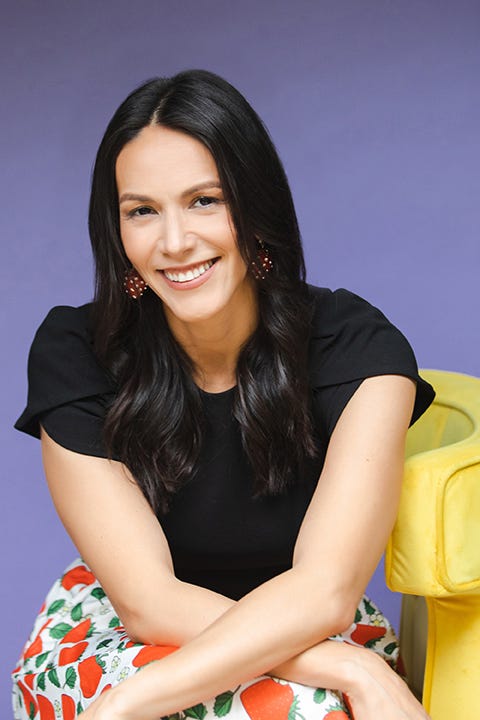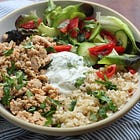Your Questions on Nutrition for Cancer by Expert Dr. Krystle Zuniga
Thanks to everyone who submitted questions for our special Q&A with guest expert, Dr. Krystle Zuniga, PhD, RD, CSO, LD. We’re excited to share her answers with you!
October is Breast Cancer Awareness Month, an important time to pause and reflect on the powerful role nutrition can play in both reducing cancer risk and supporting healing during and after treatment.
This month, we’re honored to welcome Dr. Krystle Zuniga, PhD, RD, CSO, LD, a board-certified oncology dietitian, educator, and science communicator with a passion for translating the latest research into everyday, practical tools for cancer survivors.
We’re thrilled to have her share how nutrition, especially a Mediterranean-style diet, can support the body through prevention, treatment, and recovery.
Thanks to everyone who submitted questions! In this Q&A, Dr. Krystle Zuniga shares:
What a cancer-protective diet looks like
The connection between BMI, body fat, and estrogen-driven cancers
How to meet your nutrient needs without dairy, legumes, or oats
What to focus on if you’ve had cancer more than once
The truth about wine and cancer risk (and why mocktails are having a moment!)
How to approach nutrition with blood cancers like leukemia
About Dr. Krystle Zuniga
Krystle is an experienced clinician, educator, scientist, and science communicator. In addition to her current position as Assistant Professor of Instruction in the Department of Nutritional Sciences at University of Texas at Austin, she is a board certified oncology dietitian and owner of the private practice, social media account, and podcast Cancer Nutrition HQ, where she strives to combat misinformation, share the latest research in nutrition and cancer, and translate the science into everyday actions cancer survivors can take to support their health and quality of life with nutrition.
Here are some of the top questions you submitted, along with her insightful and practical advice!
Q&A Highlights:
Q: What’s a good diet to stay healthy and reduce the risk of HR+ (estrogen receptor–positive) cancers?
Dr. Zuniga’s Answer:
The most common cancer in women is breast cancer, and it is estimated that 1 in 8 women will be diagnosed with breast cancer in their lifetime.
The American Institute for Cancer Research (AICR) and the World Cancer Research Fund (WCRF), recommendations for cancer prevention include:
Maintaining a healthy body weight
Limiting red meat and avoiding processed meat
Limiting alcohol intake
Minimizing ultra-processed foods and sugar-sweetened beverages.
Eating a diet rich in whole grains, fruits, and vegetables
Being physically active
A cancer-protective diet is primarily plant-forward, but this doesn’t mean you need to be vegetarian or vegan. Plant-forward means most of your plate should be filled with vegetables, fruits, whole grains, beans and legumes, with smaller portions of animal-based foods such as fish, poultry, or eggs.
Following these recommendations not only reduces the risk of other cancers but can reduce the risk of other chronic diseases, including cardiovascular disease, diabetes, and dementia.
Q: What is a good BMI for estrogen-fueled cancers?
Dr. Zuniga’s Answer:
Obesity (defined as a BMI over 30 kg/m²) is a known risk factor for at least 13 different cancers, including postmenopausal breast cancer. That said, BMI doesn’t tell the whole story. What really matters is excess body fat. Excess fat tissue isn’t just an energy storage site; fat cells are metabolically active and contribute to the production of estrogen that can promote the growth of hormone receptor–positive cancers. High levels of body fat also contribute to chronic inflammation, which can lead to cell damage and create an environment that supports cancer development. This is why one of the cancer prevention recommendations is to “Be a healthy body weight.”
Q: How can I find healthy recipes if I can’t have dairy, legumes, or oats?
Dr. Zuniga’s Answer:
A cancer protective diet is absolutely possible, even with dietary restrictions. While dairy is a good source of calcium, many plant-based milks are fortified with calcium. You can also get calcium from leafy greens, almonds, or a supplement if necessary. Consuming adequate calcium is important since calcium intake may be protective against colorectal cancer.
For cancer prevention, it is recommended to aim for at least 30 grams of fiber per day. Although legumes and oats are great sources of fiber, you can easily meet your fiber goals with other foods:
Whole grains like wheat, bulgur, brown rice, and quinoa
High-fiber fruits such as blackberries, raspberries, and pears (each providing around 6–8 grams of fiber per serving)
Chia or flax seeds, which add about 4-5 grams of fiber per tablespoon
The key is focusing on the foundations of a healthy eating pattern, one rich in fiber, vitamins, minerals, and protective phytochemicals. One of the best parts about the cancer prevention guidelines is how flexible they can be. You can tailor them around your food preferences, allergies, or intolerances and still have a dietary pattern that reduces your risk of cancer.
Consider using the New American Plate from AICR as your guide. No fancy recipes needed. Just focus on two-thirds of your plate being plants, and the other one-third a lean protein.
🥗 Pam & The Team: Check out our guide:
Q: What foods and drinks should I limit or avoid if I’ve had cancer more than once? And what should I focus on?
Dr. Zuniga’s Answer:
There isn’t a special or separate diet that cancer survivors need to follow. In fact, the same cancer prevention recommendations from the AICR/WCRF apply to survivors as well. While research on diet in cancer survivorship is still growing, the current evidence suggests that adhering to these guidelines may improve overall survival and quality of life.
Survivors should also be aware that depending on the cancer type and treatment history, they may be at an increased risk for other chronic conditions such as heart disease, diabetes, or even a second cancer. That’s why it’s so important to stay connected with your healthcare team, continue regular checkups, and keep up with recommended screenings such as mammograms starting at age 40 and colorectal cancer screening starting at age 45 (or earlier if you’re at higher risk). Talk with your provider about what screening schedule is best for you.
In terms of nutrition, the focus remains on the same cancer-protective habits:
Maintain a healthy weight
Limit alcohol, ideally avoiding it altogether
Limit red meat to 12-18oz/week and avoid processed meats
Limit ultra-processed foods and sugary drinks
Eat a plant-forward diet
Be physically active
Q: Are there specific foods someone with leukemia or other blood cancers should avoid?
Dr. Zuniga’s Answer:
There isn’t a specific “leukemia diet,” or a specific diet for any cancer, really. Occasionally, certain treatments or side effects may require short-term diet adjustments, but for the most part, the goal is to focus on the foundations of a healthy diet.
I know that’s not the most exciting answer, but it’s the truth. The evidence consistently shows that the best approach is to stick with the same cancer prevention and survivorship guidelines I previously mentioned.
Following these recommendations helps promote good metabolic health, reduce inflammation, support detoxification, and strengthen the immune system, which are all beneficial during and after cancer treatment.
You don’t need to follow restrictive or trendy plans like alkaline diets or juice cleanses that aren’t supported by science. The foundations of a healthy dietary pattern, even though they sound simple, are what have the biggest influence.
Q: What’s the science behind wine and cancer risk?
Dr. Zuniga’s Answer:
Although red wine is often promoted as being “heart healthy,” the potential heart benefits don’t outweigh the cancer risks. Interestingly, less than half of Americans are aware of the link between alcohol and cancer.
Even moderate consumption of alcohol can increase the risk of cancer. Alcohol is classified as a Group 1 carcinogen by the International Agency for Research on Cancer, meaning there is strong evidence it causes cancer in humans. It’s been linked to at least seven different cancer types, including breast, colorectal, liver, mouth, throat, and esophageal cancers.
Whether it comes from wine, beer, or spirits, alcohol is metabolized into a compound called acetaldehyde, a carcinogen that can damage DNA.
Alcohol can also raise estrogen levels. That’s because the liver prioritizes breaking down alcohol before it can process and convert estrogen into less activate metabolites. This can result in higher circulating estrogen levels, which may increase the risk of hormone receptor–positive cancers, such as breast cancer.
The metabolism of alcohol also promotes oxidative stress and inflammation, which can damage cells and create an environment that supports cancer development.
Even one drink per day can raise breast cancer risk, and studies estimate that women who drink two alcoholic beverages per day (compared to less than one per week) could see about five additional cases of alcohol-related cancer per 100 women. For men, that increase is about three additional cases per 100 men. Because of this elevated level of risk at even low levels of consumption, the safest level of alcohol for cancer prevention is none.
It has been exciting to see the growing popularity and availability of non-alcoholic options. Non-alcoholic craft beers, mocktails, and zero-proof wines and spirits can offer similar tastes and social enjoyment without the alcohol. While alcohol is deeply embedded in many cultures, it’s important to remember that “socially accepted” doesn’t mean “risk-free.”
In full disclosure, I do enjoy an occasional alcoholic drink, but I also have several go-to mocktails!
PURPOSEful next steps:
Take a look at your plate. Focus on adding more plants. This blog has some helpful tips:
Aim for 30 grams of fiber per day. This blog dives into the importance of fiber and simple ways to add more:
Be mindful of your alcohol intake. We talk about practical tips for reducing your alcohol consumption.
P.S. Want to dive deeper into cancer nutrition?
Follow Dr. Kyrstle Zuniga on Instagram. You can also check out her website and her podcast. Give her a follow, take a listen, and share her work with a friend who could use this info too!





